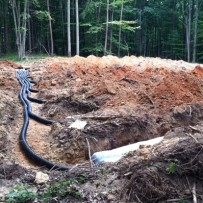Septic System Basics for Homeowners

Septic systems are biologic wastewater treatment systems that consist primarily of holding tanks and absorption fields. A holding tank collects wastewater exiting a house or structure. Solids settle to the bottom of a tank and liquid effluent (gray water) is transported to an absorption field by means of a distribution box. Absorption fields utilize soil to percolate and purify wastewater before entering groundwater reserves. If residents are aware of early warning signs and causes of a failing septic, then their investment can be protected.
Indicators of a troubled septic:
- Slow draining plumbing.
- Sewage odors.
- Continued wet or soft ground above absorption field.
- Lush green vegetation over absorption field.
- Water tests show presence of bacteria / fecal coliform.
Causes of a troubled septic:
- Excess soil compaction above drainfield (driveways, machinery, livestock).
- Flushing or inserting solids into plumbing.
- Impeding vegetation roots.
- Design / installation error.
- Lack of maintenance.
Protect your investment. Prevent future septic issues and expenses:
- Pump septic tank every 3-5 years.
- Properly dispose of oils, fats, paints, chemicals, paper products and cat litter (Not down the drain).
- Avoid excess garbage disposal use.
- Avoid unnecessary septic tank treatment chemicals and additives.
